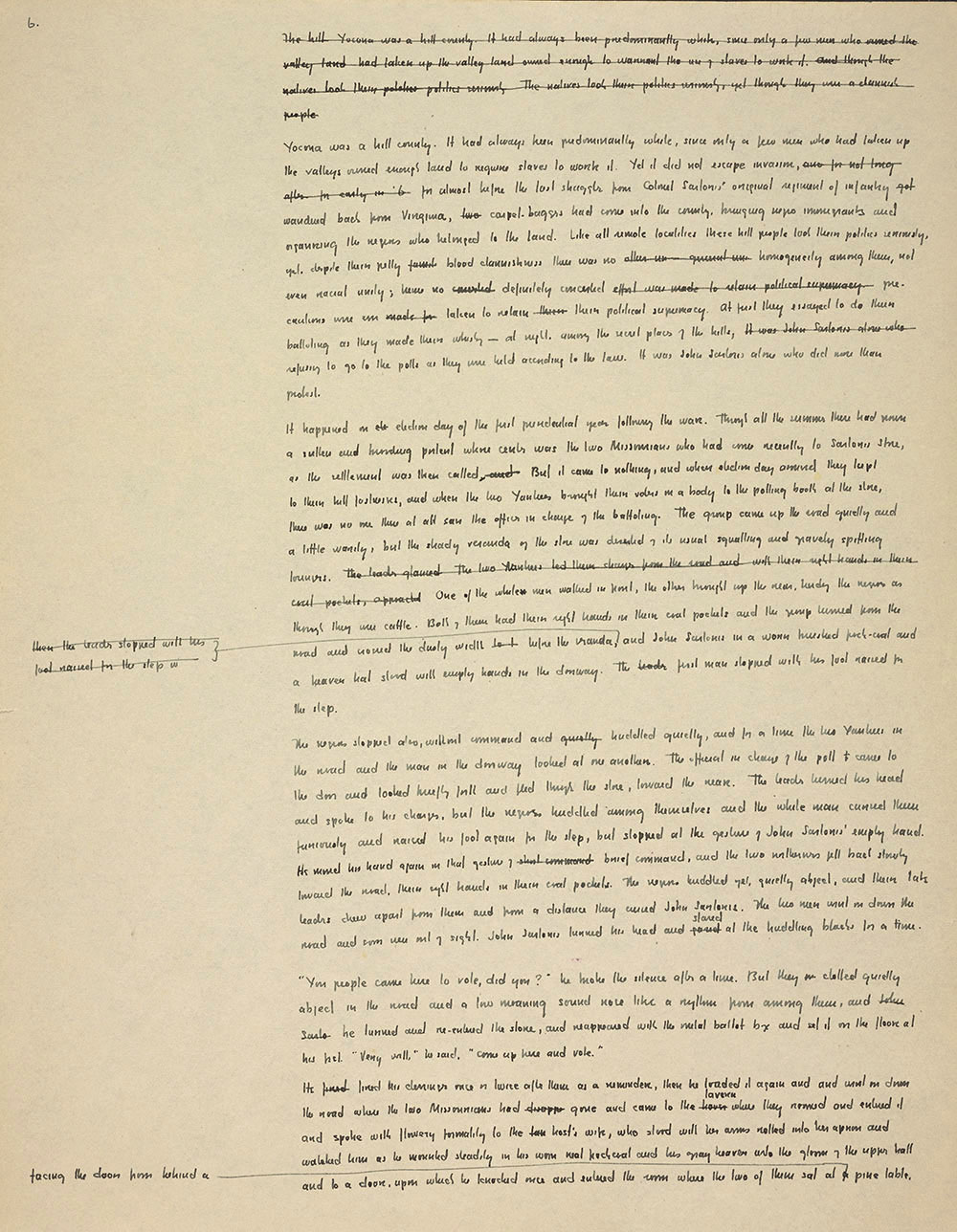TRANSCRIPTION
<The hill> <Yocona was a hill county. It had always been predominantly white, since only a few men who <<owned the
valley land>> had taken up the valley land owned enough to warrant the use of slaves to work it. And though the
natives took their <<politics>> politics seriously.> <The natives took their politics seriously, yet though they were a clannish
people>
Yocona was a hill county. It had always been predominantly white, since only a few men who had taken up
the valleys owned enough land to require slaves to work it. Yet it did not escape invasion, <and for not long
after> <for early in '6> for almost before the last straggler from Colonel Sartoris' original regiment of infantry <got>
wandered back from Virginia, <two> carpet-baggers had come into the county, bringing negro immigrants and
organizing the negroes who belonged to the land. Like all remote localities these hill people took their politics seriously,
yet, despite their petty <famil> blood clannishness there was no <[other un?> <general un> homogeneity among them, not
even racial unity; hence no <concerted> definitely concerted <effort was made to retain political supremacy> pre-
cautions were ever <made for> taken to retain <[thier?]> their political supremacy. At first they essayed to do their
balloting as they made their whiskey — at night, among the secret places of the hills, <It was John Sartoris alone who>
refusing to go to the polls as they were held according to the law. It was John Sartoris alone who did more than
protest.
It happened on <ele> election day of the first presidential year following the war. Through all the summer there had grown
a sullen and brooding portent whose center was the two Missourians who had come recently to Sartoris store,
as the settlement was then called. <and> But it came to nothing, and when election day arrived they kept
to their hill fastnesses, and when the two Yankees brought their voters in a body to the polling booth at the store,
there was no one there at all save the officer in charge of the balloting. The group came up the road quietly and
a little warily, but the shady veranda of the store was deserted of its usual squatting and gravely spitting
loungers. <The leaders glanced> <The two Yankees led their charges from the road and with their right hands in their
coat pockets, approached> One of the white men walked in front, the other brought up the rear, herding the negroes as
though they were cattle. Both of them had their right hands in their coat pockets and the group turned from the
road and crossed the dusty width <to t> before the veranda,
[margin: <then the leader stopped with his foot raised for the step w>]
and John Sartoris in a worn brushed frock-coat and
a beaver hat stood with empty hands in the doorway. The <leader> first man stopped with his foot raised for
the step.
The negroes stopped also, without command and <quietly> huddled quietly, and for a time the two Yankees in
the road and the man in the doorway looked at one another. The official in charge of the poll <[illegible]> came to
the door and looked briefly forth and fled through the store, toward the rear. The leader turned his head
and spoke to his charges, but the negroes huddled among themselves and the white man cursed them
furiously and raised his fool again for the step, but stopped at the gesture of John Sartoris' empty hand.
He moved his hand again in that gesture of <short command> brief command, and the two northerners fell back slowly
toward the road, their right hands in their coat pockets. The negroes huddled yet, quietly abject, and their late
leaders drew apart from them and from a distance they cursed John Sartoris. The two men went on down the
road and soon were out of sight. John Sartoris turned his head and <gazed> stared at the huddling blacks for a time.
"You people came here to vote, did you?" he broke the silence after a time. But they <[illegible]> clotted quietly
abject in the road and a low moaning sound rose like a rhythm from among them, and <John
Sarto> he turned and re-entered the store, and reappeared with the metal ballot box and set it on the floor at
his feet. "Very well," he said, "come up here and vote."
He <fired> fired his derringer once or twice after them as a reminder, then he loaded it again and and went on down
the road where the two Missourians had <disapp> gone and came to the <house> tavern where they roomed and entered it
and spoke with flowery formality to the <lan> host's wife, who stood with her arms rolled into her apron and
watched him as he mounted steadily in his worn neat frockcoat and his gray beaver into the gloom of the upper hall
and to a door, upon which he knocked once and entered the room where the two of them sat at <a;>
[margin: facing the door from behind a]
pine table,
|


